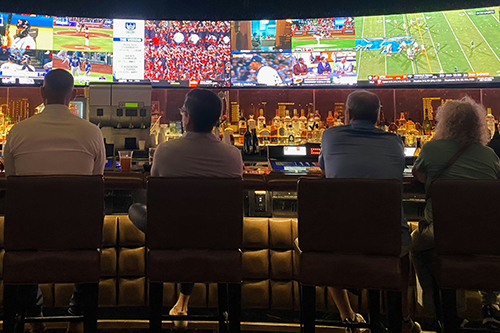
A group of people sitting at a bar watching sport on TVPhoto by Amit Lahav on Unsplash
A new study, by the University of Bristol and Ipsos, adds to mounting evidence showing gambling marketing needs much stricter national regulation.
The report, commissioned by GambleAware, found Great Britain has the most lenient regulations on gambling ads, despite having more research on the negative effects of gambling marketing than several other European countries combined. The charity has issued an urgent call to protect the public from gambling harm.
It highlights how bans on gambling marketing across Europe are increasingly becoming the norm in response to public health concerns about gambling harm and how children are especially at risk.
Dr Raffaello Rossi, Lecturer in Marketing at the University of Bristol Business School, and report author, said: "Our research shows that Great Britain has the strongest evidence of gambling marketing's harms but some of Europe's fewest restrictions. This suggests the lack of tight restrictions isn't due to insufficient evidence but rather a lack of political will.
"Across Europe, bans on gambling marketing are increasingly the norm, seen as necessary to protect the public. Great Britain, however, is becoming an outlier with almost no meaningful restrictions. The evidence is clear — policymakers must act urgently to protect millions from preventable harm."
GambleAware, the leading charity and strategic commissioner of gambling harms prevention, is today calling for a pre-watershed ban on broadcast adverts, restrictions on gambling content and marketing online, a blanket ban across sports, and mandatory health warnings.
The report reveals Great Britain is falling behind in implementing legislation on gambling marketing – particularly in comparison to other European countries such as Italy, Spain, Germany, the Netherlands and Belgium.
It also identified almost 500 published research papers over the last decade from British universities including specialist gambling units at academic institutions such as Bristol, Bournemouth, and Glasgow. Despite this totalling more research than Italy, Germany, the Netherlands and Belgium combined, there is no primary legislation in place to regulate gambling marketing including on TV, radio, online and in sport.
There is strong evidence to show gambling advertising increases participation and therefore risk; exacerbates harm; and normalises gambling as just a bit of 'harmless fun', particularly amongst children.
Professor Siân Griffiths CBE, public health expert and Chair of GambleAware Trustees, said: "We have previously highlighted that the lack of gambling advertising and marketing regulation in this country is a missed opportunity. It is important we remember that gambling can be addictive and gambling harms need to be recognised as a public health issue that can affect anyone.
"We have long been concerned about the impact gambling ads and marketing can have on children and young people. This is why urgent action is needed to protect the next generation from experiencing harm."
Latest estimates from 2017 suggest gambling operators spend around £1.5 billion per annum on advertising and marketing. Research, led by the University of Bristol in September, also showed Premier League fans were subjected to nearly 30,000 gambling messages on this season's opening weekend – a 165 per cent increase on the year before.
The increase comes despite clear public support to take action, as GambleAware and Ipsos data revealed in June that an overwhelming majority say there is currently too much advertising about gambling (67 per cent), and support more regulations on both social media (74 per cent) and TV (72 per cent).
Lord Foster of Bath, Chair of Peers for Gambling Reform, said: "Every day we are bombarded by gambling advertising, marketing and sponsorship on TV, radio and online. There is huge public support to curb it and there's a wealth of research showing the harm it causes. But we remain woefully behind the curve in terms of the regulation needed to protect individuals from harm.
"Crucially, the power to regulate key aspects of this – such as gambling advertising – is already within the gift of the Secretary of State as set out in the Gambling Act 2005. Our current regulations are too lenient, and fail to advance the much-needed public health approach to gambling that Peers for Gambling Reform has long called for."
In 2022 the Bristol Hub for Gambling Harms Research was launched at the University of Bristol to lead pioneering multidisciplinary research into the wide-reaching effects of gambling harms.
The independent hub, funded by a grant of £4 million from national charity GambleAware, facilitates world-leading research to improve understanding of gambling harm as a growing public health issue which needs greater scrutiny and regulation.
Whether experiencing harm directly or as an affected other, you can reach out to the National Gambling Helpline at 0808 8020 133. It's available 24/7 and offers free, confidential advice, tools, and support.
Report
'Drivers of gambling marketing restrictions – an international comparison' by the University of Bristol and Ipsos UK






